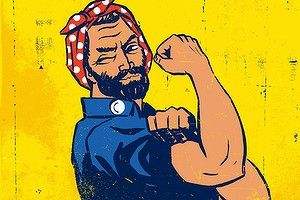Australia is a gender-unequal society. If we look honestly at our patterns of political power, economic decision-making, cultural representation, and men’s and women’s everyday lives and relations, we can see a widespread pattern of gender inequality. Gender inequalities are sustained in part by men – by men’s attitudes, behaviours, and relations.
Gender inequalities are sustained and reproduced day after day, in part by men. By how many men think, by how many men behave, by how men relate to women and how they relate to other men.
Now often we understand gender inequality in terms of female disadvantage. But the flipside of this is male advantage.
People often talk about gender inequality in terms of women’s disadvantage, discrimination against women, or women’s exclusion from economic decision-making and political power. But the flipside of this is men’s privilege, a longstanding program of affirmative action for men, and men’s monopoly of power.
Male privilege is personal. Male privilege is everyday. Many men, probably most men, do sexism in our everyday lives, in a myriad of ways. Myself included.
In fact, male privilege is personal. Male privilege is everyday. Many men do sexism in our everyday lives, in a myriad of ways. Myself included. I think of times when I’ve left the burdens of domestic work to women, whined when a girlfriend didn’t feel like sex or underestimated women’s achievements and skills.
 Not all men are privileged, and not all women are disadvantaged. Men’s lives, like women’s, are shaped by intersecting forms of privilege and disadvantage, to do with gender, class, ethnicity, sexuality, disability, and so on. Some groups of men are deeply disadvantaged – not because they are men, but because they are members of other, disadvantaged social categories.
Not all men are privileged, and not all women are disadvantaged. Men’s lives, like women’s, are shaped by intersecting forms of privilege and disadvantage, to do with gender, class, ethnicity, sexuality, disability, and so on. Some groups of men are deeply disadvantaged – not because they are men, but because they are members of other, disadvantaged social categories.
Even when we men are not actively being sexist, we benefit from male privilege. Men benefit from male privilege (the unearned advantages of an unequal system), whether we want to or not.
As a man, when I open my mouth, my views often are given more weight than a woman’s views. When I send in my CV or have a job interview, I am likely to be seen as more competent, because I am male, than a woman with the same skills and experience. I’m a father, and if I work long hours at work, it’s unlikely that anyone will think I’m being selfish and neglecting my children.
If I’m a senior leader, there is no tension between my gender and my role. As a man, I’m assertive, but she’s bossy. I’m enthusiastic, but she’s emotional. When I take tough decisions, I’m confident or firm, but her, she’s a bitch.
Gender inequalities are personal and interpersonal. But they are also organisational and structural. They are built into the structures, processes, and cultures of workplaces: their divisions of labour, their decision-making, their informal norms and expectations.
Members of privileged groups think that our achievements are the result of our efforts and skills, not the unearned advantages of an unequal system.
But the privileges given to men by these structures and processes are naturalised and normalised. They are invisible. So members of privileged groups think that our achievements are the result of our efforts and skills, not the unearned advantages of an unequal system.
 Why should men promote gender equality? Above all, because it’s the fair and right thing to do. Men receive unfair and unjust privileges, so we have an ethical obligation to address that privilege. Ultimately, men will also benefit.
Why should men promote gender equality? Above all, because it’s the fair and right thing to do. Men receive unfair and unjust privileges, so we have an ethical obligation to address that privilege. Ultimately, men will also benefit.
We will benefit from progress towards gender equality. It will benefit our personal well-being by freeing us from the costs of masculine conformity: poor health, shallow relationships and early death. It will benefit our relationships and friendships. And it will benefit our workplaces and communities with more flexible divisions of labour, reductions in violence against women, workplaces with greater productivity, creativity, and diversity.
Men – men who care for women, men who care for justice and equality, and men who care for the wellbeing of our communities and society – must act to end gender inequality. And if we do, men will benefit. If we can make progress towards gender equality, then women will have better lives, and so will men.
Join us for our first in the 2020 BroadAgenda Public Talk Series – Emancipation of Men: Masculinity at Crossroads – featuring speakers Phil Barker, Jane Caro, Dr Michael Flood and Elise Stephenson, at Ann Harding Centre, University of Canberra on 13 February 5.30-7.30. Register here. See you there!




